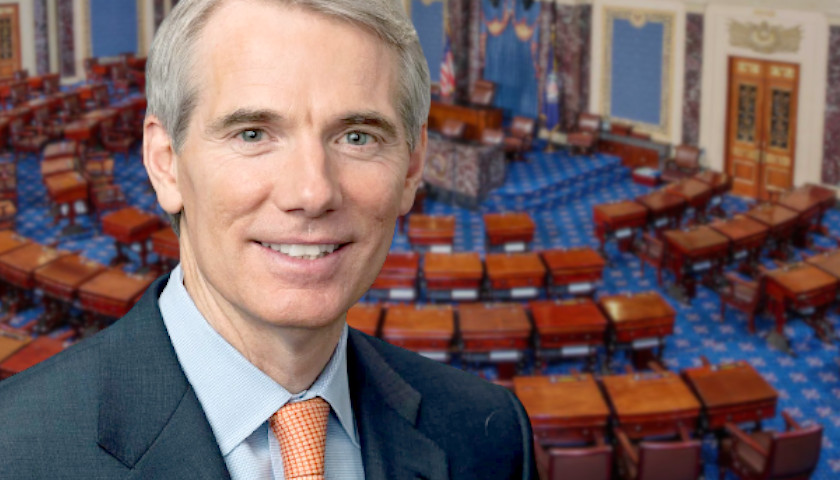Same-sex marriage is on track to becoming codified in federal statute, and retiring U.S. Senator Rob Portman (R-OH) is celebrating his role as a key driver of the change.
In 2013, Portman became the first Republican senator to support redefining marriage as something other than the matrimonial union between one man and one woman. He attributed the reversal of his prior opposition to gay marriage to his son had come out two years earlier.
After the U.S. House bill creating a federal law favoring homosexual unions — which heretofore existed nowhere in either the U.S. Constitution or the federal code — passed the Senate 61-36 this week with the support of 12 Republicans, the senator rejoiced.
“This is a momentous day in the Senate and I am proud of my colleagues whose hard work made passage of this bill possible,” Portman said. “The American people want this issue settled, and with the passage of this bill, millions of married couples will get the certainty and peace of mind they deserve by having their marriage protected.”
More Republican public officials decided to embrace Portman’s new position in the years since his switch. They got substantial political cover for doing so owing to the U.S. Supreme Court’s 2015 Obergefell v. Hodges ruling forcing all states to accept gay-marriage licensure. But the bill poised to get passed in final form by the U.S. House of Representatives and signed by President Joe Biden raises broader concern for backers of traditional marriage: Will government coerce private institutions to support the new federal policy?
In the run-up to Senate passage, Senator Mike Lee (R-UT) raised that worry, citing dialogue between then-U.S. Solicitor General Donald Verrilli and Supreme Court Justice Samuel Alito during the Obergefell oral arguments. The attorney acknowledged to the justice that national recognition of homosexual marriage would force private educational institutions and other nonprofits to change their policies or cede their tax-exempt status.
“It’s certainly going to be an issue,” Verrilli told Alito. “I don’t deny that.”
Possible governmental retaliation against private institutions led Lee to offer an amendment to what supporters call the “Respect for Marriage Act” which would protect organizations with traditional attitudes toward marriage. The Democrat-led Senate nevertheless defeated the Lee measure 49-48. Portman and all other Republican senators present except for Susan Collins (R-ME) voted for Lee’s amendment; Democratic West Virginia Senator Joe Manchin also voted with Lee.
The Senate’s failure to get a majority of members to concur on protections for religious nonprofits spurred outrage and calls for vigilance among conservative legal experts.
“Christian organizations better lawyer up,” attorney and Georgia-based radio host Erick Erickson tweeted after Lee’s amendment went down and the unamended bill passed. He later lashed out at Republicans for their weak opposition to the emerging law, quoting a Politico piece suggesting perhaps 30 GOP senators were privately happy with the bill’s passage and sarcastically commenting, “But remember, Christians, the GOP is the party you have to support.”
Christian organizations better lawyer up. https://t.co/jTp8Slvop5
— Erick Erickson (@EWErickson) November 29, 2022
Tony Perkins, president of the D.C.-based Family Research Council and chairman of the U.S. Commission on International Religious Freedom, voiced similar disappointment at Portman and other Republicans who voted for Lee’s amendment but backed the bill’s final passage regardless. He called the proposed statute “a club with which the left will attempt to beat people of orthodox faith” who believe in traditional marriage.
“Republicans clearly acknowledged by their support of the Lee, Lankford and Rubio amendments that this legislation is a threat to the First Amendment freedoms of individual Americans,” Perkins said in a statement. “And yet 12 of 12 Republicans still chose to vote for the (Dis)Respect for Marriage Act. The (Dis)Respect for Marriage Act makes people prime targets for government harassment, investigation, prosecution, even civil action.”
Portman himself shrugged off the issues many raised against the bill regarding the free association and private adherence to tradition.
“I… listened to the concerns raised by religious organizations and worked with my colleagues to strengthen the religious-liberty protections in the bill while still preserving the rights of same-sex married couples,” he said. “A group of constitutional scholars who specialize in religious liberty have analyzed the bill and concluded that it does not pose new litigation risks to faith-based groups, but contains important protections that will now be enshrined into the law.”
– – –
Bradley Vasoli is managing editor of The Ohio Star. Follow Brad on Twitter at @BVasoli. Email tips to [email protected].




